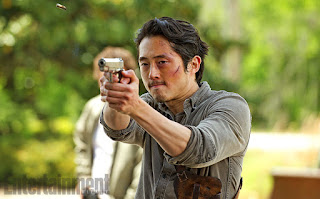Crossing a Line
"Some me just want to watch the world burn." — Alfred, "The Dark Knight"
SPOILERS BELOW:
"The Walking Dead" returned for its seventh season on Sunday, and it was a hotly anticipated episode. When the sixth season ended in March, our heroes were in a pickle. Negan (Jeffrey Dean Morgan), a serious villain from the comics, had arrived and planned on taking at least one of the group out. But as the camera went to black, we didn't know who.
As it opened Sunday, we found out. And it was not one, but two heroes claimed, as Abraham and Glen met a grim fate. It was the darkest, most violent episode in the history of a show that has never shied away from graphic content. And it's an episode that has many fans asking if the show crossed a line.
I had a very strong reaction to the episode, and that's that I was deeply unsettled by it. In fact, I was unsettled to the point that I wondered if I was done with the show. I think, in part, that's due to the way the story was crafted. Negan is unlike any villain before, and the show is about to veer into much darker territory.
It was also graphic in a way it hasn't been in the past. There was a vicious brutality to the deaths of the characters last night that made it hard to watch. Equally as hard was the interactions between Negan and those who lived. The idea was about what it would take to break out heroes — particularly Rick — and in the process it may have broken the audience, too.
But there was another thought I couldn't escape — and that was the hubris of our heroes that led them into this situation. They thought they had the world figured out, even in its cruelty and brutality. They didn't think there was any person, or any situation, they'd encounter that couldn't be overcome.
They were wrong. And my guess is the balance of season seven — hopefully with less brutality — will be about finding a new gear.
It reminded me of "The Dark Knight," when Bruce is confounded by The Joker, who doesn't act like any criminal that he's encountered before. He's frustrated because he thinks all evil men are the same. But Alfred reminds him that men are cruel in their own ways by telling a story.
He says, " With respect Master Wayne, perhaps this is a man that *you* don't fully understand, either. A long time ago, I was in Burma. My friends and I were working for the local government. They were trying to buy the loyalty of tribal leaders by bribing them with precious stones. But their caravans were being raided in a forest north of Rangoon by a bandit. So, we went looking for the stones. But in six months, we never met anybody who traded with him. One day, I saw a child playing with a ruby the size of a tangerine. The bandit had been throwing them away."
Bruce then asked, "So why steal them?"
Alfred replied, "Well, because he thought it was good sport. Because some men aren't looking for anything logical, like money. They can't be bought, bullied, reasoned or negotiated with. Some men just want to watch the world burn."
Negan acts like he's looking for money, and he is about consolidating power and creating a network. And I'm sure as the season unfolds, we'll see that he has some deeper motivations. But from what we've seen, he's also unlike anything we've seen in this world — and that's saying a lot. The metaphor of "The Walking Dead" is the fallen nature and inherent cruelty of men, and Negan is a cut above the rest. He's happy to see the world burn, to accept challenges just to see if he can win and to brutalize people to see what it does to the world around him.
That's deeply unsettling — both in terms of being portrayed and as a concept. And it should be.




Comments
Post a Comment